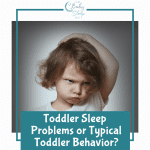
Let’s be honest for a moment. Our toddlers are cute — no doubt about that! But sometimes, their behavior is…well…weird.
Picking their noses in public? Drinking the bathwater? Insisting on being naked at all times? Throwing tantrums over the color of their socks?
Yeah…toddlers can be strange little people sometimes!
And speaking of strange — have any of you ever noticed that your toddler sometimes engages in some rather odd self-soothing behavior before naptime or bedtime? Things like banging their heads against the wall, rocking back and forth, or tugging on their hair?
That’s what we’re tackling today. We’ll take a look at some of the unusual, odd, and just flat-out weird self-soothing behaviors that many toddlers try out from time to time. We’ll look at why our toddlers do them, how we can handle them as parents, and when the behaviors themselves become a cause for concern.
Unusual Toddler Self-Soothing Behaviors
First, let’s define our terms. What kinds of odd self-soothing behaviors are we talking about? Well, there are many, but here’s a list of some of the most common:
- Head-banging and shaking. This may be the most alarming of all the self-soothing techniques listed here. Some toddlers tend to bang their heads (against the wall, against furniture, against the crib bars, etc.) before naps or bed. Some toddlers will also shake their heads back and forth vigorously.
- Rubbing/stroking body parts. Toddlers may stroke their bellies, ears, feet, or other more private parts as they wind down before naptime or bedtime. Some toddlers also become quite fixated on stroking their parent’s ears, faces, or hands.
- Hair pulling/twisting. Some toddlers yank on or twist their hair (or their parents’ hair!) as a way to soothe and calm themselves before sleep.
- Body rocking. Some toddlers rock their bodies back and forth (or side to side, or on their hands and knees) during the naptime or bedtime routine.
- Facial, body, or vocal tics. Toddlers may grimace, shrug their shoulders, twitch, make repetitive noises, etc. as they wind down for sleep.
Why Do Some Toddlers Engage in Weird Self-Soothing Behaviors?
There are several answers to this question, honestly. Some toddlers engage in these kinds of behaviors because they aren’t getting enough one-on-one contact with parents or caregivers — so they make up for that lack of cuddling and affection by trying to create it themselves.
For a small percentage of children, these kinds of behaviors indicate deeper, underlying issues, like learning disabilities, ADD-ADHD, or autism. They can also be a sign of Sensory Processing Disorder. We’ll address these more serious problems later on in the article.
However, for many toddlers, these behaviors aren’t an indicator of a serious problem — they’re simply the child’s (odd, weird, strange) way of calming and soothing himself. Why do toddlers find these rather bizarre behaviors soothing? Well, as this flyer from the Office of Child Development at the University of Pittsburg points out, repetitive behaviors are thought to help toddlers release tension and extra energy and act as a calming influence. Toddlers often do these behaviors when they are still full of energy but need to wind down and fall asleep (i.e. before naps and at bedtime). They may also engage in these behaviors during a developmental transition (like potty training) or a season of transition or stress (like during a move, or the birth of a new sibling).
What Should You Do About Your Toddler’s Weird Self-Soothing Behaviors?
Honestly, maybe nothing! Drawing lots of attention to these behaviors, or trying to force your child to stop doing them (or punishing your child when she does do them) will only serve to make the behavior worse (and may even make it last longer!) In many cases, you can simply ignore the behaviors, and they will eventually go away (usually by the time the child is 3 or 4.)
If you do want to take steps to minimize these behaviors, consider the following:
- If the behavior is inappropriate (like fondling private parts), then gently let your child know that it’s something they cannot do in front of others, and should do only in the privacy of their room. Make sure not to shame your toddler when you do this, though – you don’t want them to associate their sexuality with shame and guilt later in life.
- If your toddler is banging his head against something hard (like the wall), you can try padding the area where he does most of his banging.
- If your toddler is pulling or twisting her hair (or your hair!), suggest that she tug and twist a doll’s hair, instead, or perhaps tug on and twist a blanket.
- When your toddler starts doing repetitive behavior, be sure to take the time to offer plenty of cuddling and kisses. If your toddler is old enough to talk with you, you may also want to ask how he’s feeling, and if anything’s wrong. You could say something like, “I see you’re pulling on your ears – are you feeling worried? Did anything happen today that made you feel bad?”
- Take a hard look at your toddler’s schedule. Toddlers are more likely to engage in these behaviors when they have lots of pent-up energy and are bored. It’s possible that you’re putting your toddler down for a nap too early, or to bed too early. When it’s time for sleep, it’s best if your toddler is a little sleepy (but not overtired).
- Evaluate your family life to determine if there’s anything stressful or new that could be causing your toddler to do these repetitive behaviors. Again, transitions (both big and small) can cause a toddler to feel stressed. If you think something’s stressing your toddler, compensate by offering lots of affection and reassurance.
- Think about how much time you’re spending with your toddler. We’re not trying to make you feel like a bad parent here — not at all! We know our readers take parenting very seriously and are flat-out awesome moms and dads. 🙂 But even the best mom or dad may be distracted from spending time with their toddler. When you have a newborn at home, for instance, you have less time available for your toddler. Or if you’re starting back to work (or if your current job is keeping you extra busy), you will no doubt miss some time with your little one. If any of these factors are true for you, try to carve out a little extra time with your toddler each day, simply to cuddle and enjoy one another.
Your Toddler’s Weird Self-Soothing Behaviors: When To Be Concerned
While most repetitive behaviors, like the ones we’ve listed above, are perfectly normal for toddlers, in some cases, they may be a sign of a deeper problem — possibly a medical problem. Odd, repetitive behaviors may indicate…
- …Autism. Sometimes, children with Autism Spectrum Disorder become fixated on repeating behaviors again and again.
- …ADD-ADHD. Children with ADD-ADHD may unleash some of their pent-up energy by doing repetitive behaviors.
- …Tourette Syndrome. If a child has an uncontrollable urge to perform a certain action over and over, it can be a sign of Tourette Syndrome. However, most young children are more likely to have something called Transient Tic Disorder — a condition in which they develop a small tic for a period of time.
- …Sensory Processing Disorder. Sensory Processing Disorder can cause children to bang their heads. Toddlers with SPDs often seek out strong sensations like headbanging, rocking, hair pulling, squashing, and deep pressure as a way of meeting their sensory needs and calming their nervous system/brain. Consider using a weighted blanket to help him sleep better.
- …Abuse. Children who are in harsh or abusive situations may be more likely to engage in repetitive behaviors. If your child spends time in a daycare setting, or with other family members in situations where you are not also present, ensure that your child is indeed safe in these settings.
So, how can you know if your toddler’s weird self-soothing behaviors are normal, or are something more? For starters, if your child is actually harming himself (pulling out his hair, banging his head so hard he injures it, pinching or biting himself, etc.), then take action immediately, and visit a healthcare provider. In addition, if your child is withdrawing and spending lots of time alone while doing these behaviors, or if these behaviors are interfering with his ability to interact with other people, seek outside help, as this could be a sign of something serious. Overall, if you have any concerns that your toddler’s repetitive self-soothing behaviors may be a sign of something more, talk to your child’s healthcare provider.
Remember, parents — we are not trying to scare you with this information! Rather, we want to offer you this information so that, if your toddler is doing (or eventually starts doing) any of these repetitive behaviors, you have the facts you need to handle it well and make informed decisions.
Need Toddler Sleep Help? Take A Look At Our Resources!
Toddler sleep problems are definitely solvable – but they can be TOUGH to solve on your own. So why not connect with one of our caring, compassionate sleep consultants, and get expert answers to your nap questions today?
Browse our list of consultation package options here.
Once you make your choice and purchase, you will immediately receive an e-mail with your Helpdesk login information. You’ll be able to log in and get started right away – it’s that simple!
Does your toddler have any weird self-soothing habits? How have you dealt with them? Leave your tips in the comments below!
Or, join our VIP Members Area packed with exclusive content and resources: e-Books, assessments, detailed case studies, expert advice, peer support, and so much more. It actually costs less to join than buying products separately! As a VIP member, you’ll also enjoy a weekly chat with an expert sleep consultant.
For those persistent toddler sleep struggles, check out The 5 Step System to Help Your Toddler Sleep. Using the same unique approach and practical tools for success, this e-book helps you and your toddler sleep through the night and enjoy a better daytime schedule.









